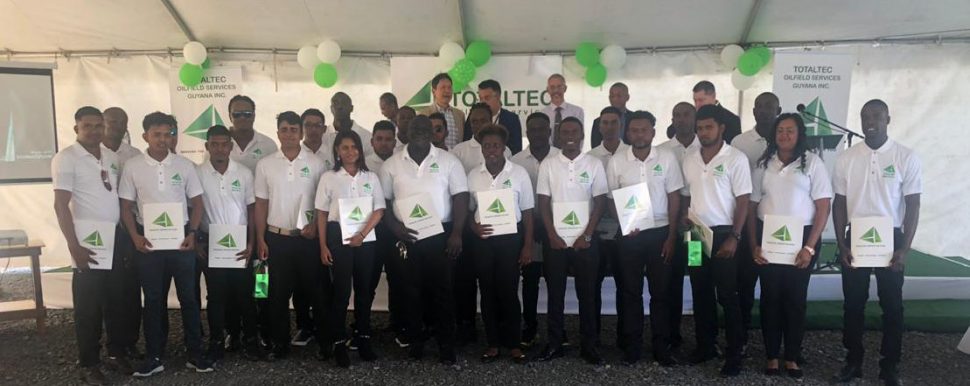Twenty-five more Guyanese are closer to being able to gain footholds in the emerging oil and gas industry after they completed an eight-week immersion programme in safety and operational training at the TOTALTEC Oilfield Services Academy.
According to TOTALTEC’S Chief Executive Officer Lars Mangal, the programme was developed towards building capacity and local content while giving Guyanese an opening to participate in the industry. He explained that over the eight-week period, the students would have been trained in basic safety, rigging and lifting, oil and gas operations safety, environmental best practice, transport and cargo handling, slingers and practical training.
The 25 graduates also brought the total number of students trained by the academy to 100 over the last year.
In giving the feature address at the graduation, head of the Department of Energy (DoE) Mark Bynoe said that the event signals exciting times for the country. He said that capacity building to ensure that Guyanese are prepared for the transformation that is synonymous with oil discoveries will ensure that a greater proportion of Guyanese are contributing to the local content mix, which he said remains a commitment of the department.
Bynoe explained that experiences across the world have shown that when development occurs in the oil and gas sector, enhancement of human capacity to deal with the transformation remains essential.
As a result, he said, the department will continue to work with all serious-minded and committed partners in the industry to ensure the successful, efficient and effective long-term development of Guyana’s resources.
“Guyana is finally moving towards unleashing her potential. We are on a journey, but a journey not for the fainthearted…, but one for aggressive, industrious and innovative minds as we see before us in our batch of graduates,” he said.
He noted that many petro-developing states have focused on a people-centred and balanced approach, utilising the oil and gas resources for structural transformation and improving peoples’ lives in the short-term in order to catapult them in the medium-term to transition to post-carbon economic growth.
He added that this may be a model that Guyana might wish to emulate, if not pursue. But, in a new and emerging petro-developing state, local content policy will support infant industries, particularly outside of the conventional oil and gas support industries, he said.
According to the DoE head, these industries can grow and develop comparative advantages over time in areas of economic activity that have non-oil applications and eventually employ a large number of people that will contribute to building a more robust economy through resource-led development.
“We are setting in place the relevant policy environment and conditions to allow our Guyanese private sector to participate fully and take advantage of Guyana’s resources. However, we must be cognisant of the relatively nascent nature of our private sector and, as such, focus in the short term could be on establishing joint ventures and state-led industrialisation and job creation anchored in oil and gas that diversifies the economy away from oil,” he said. Bynoe added that the challenge is not about the creation of jobs but how to create jobs that are good for citizens and also how to produce the outcomes of the education system that fit the job market.
He said, therefore, the DoE is encouraging enhanced training and education while the skills needed to meet the industry’s employment standards are also a priority.
Minister of Business Dominic Gaskin also made brief remarks and said that the government supports training programmes that are aimed at building local capacity since the sector is new and the country lacks the trained workforce or supplier capacity to service the industry.
“As a government, we also believe that local capacity should and must be built to the extent that Guyana’s oil and gas sector employs Guyanese at all levels and across all skillsets which also benefits other sectors,” Gaskin said. He added that the government places a lot of emphasis on local content not because it sounds nice but because Guyana’s oil belongs to the Guyanese people.






